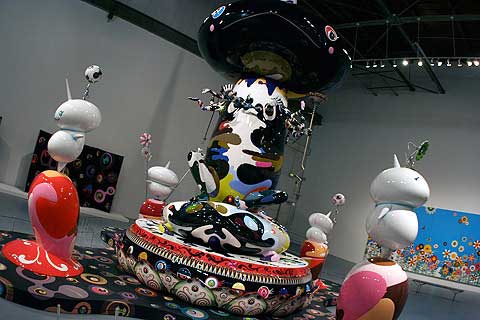 Art Scatter has taken an obsessive interest in watching the Los Angeles Museum of Contemporary Art as it tiptoed along the crumbly edge of the abyss. After all, MOCA is an internationally important arbiter and collector of new art with big curatorial ambitions (at this point, some might say too big), and its effect on how we consider the general “drift” of art in our times is out of proportion to its $20 million per year budget. Which is to say the museum gets a lot for its money.
Art Scatter has taken an obsessive interest in watching the Los Angeles Museum of Contemporary Art as it tiptoed along the crumbly edge of the abyss. After all, MOCA is an internationally important arbiter and collector of new art with big curatorial ambitions (at this point, some might say too big), and its effect on how we consider the general “drift” of art in our times is out of proportion to its $20 million per year budget. Which is to say the museum gets a lot for its money.
Somewhere along the line, both the board and museum director Jeremy Strick made a nearly fatal error — when their income didn’t reach $20 million a year, they didn’t adjust. They just covered the shortfall from their endowment, which had peaked around $40 million and by this fall had dwindled to $7 million or so. Strick didn’t cut expenses sufficiently. The board and development staff didn’t find new sources of income — even during the height of the LA real estate bubble. And so, the museum found itself near extinction in November.
When Art Scatter last checked in, MOCA had two proposals in hand. First, an offer of $30 million (half to rebuild the endowment, half to support exhibitions for the next five years) from Eli Broad, who has a convoluted relationship with MOCA, the LA County Museum of Art (LACMA) and many other art institutions in the area. Lots of money. Lots of opinions. Lots of personality. Second, LACMA offered to merge with MOCA and take all that pesky fundraising off its hands and give it room to show its huge collection of art — wall space is at a premium at MOCA’s two primary exhibition sites.
On Dec. 22 (see, we’re a little late on this) the MOCA board chose the Broad option, Strick resigned from his position and a new CEO was put in charge. The museum says it has already raised more than enough to cover Broad’s $15 million challenge grant for the endowment. The LA Times, which has covered the story closely, has a good account of the final deal. LA Times art critic Christopher Knight, whose commentary on events has been sharp and well-reasoned, criticized the deal on a three grounds: 1) it sets annual dues for trustees at $75,000, which limits board membership to the very wealthy; 2) by discarding only Strick, the board didn’t take responsibility for its own failings; 3) the new CEO position might turn into something unfortunate if it’s not temporary. But he still favored it over a merger with LACMA.
So, back to our obsession with it all. We watch MOCA here in Portland (or wherever you are) as a sort of case study. In this case, the “lesson” seems to be pretty clear: arts organizations have to live within their means. Artistic success and standing aren’t substitutes for the hard day-to-day fundraising and penny-pinching that must go on, even in a rich place like LA.
Then we look for local analogs. Even though I can’t think of a local parallel off hand, I know that the boards of our cultural institutions get tired of writing checks and cajoling others for money. They lose the sense of urgency that they must have, because the lights can go out on almost any arts organization in town in a heartbeat. And the staffs get tired, too — of making do with what seems so little, of keeping their spirits high when money, and the appreciation it implies, is so hard to come by. Which makes it all the more important for those of us who “get” this, to do something about it, to show both our appreciation and give what we can.
Fortunately, we in Oregon have an excellent avenue for giving, the Oregon Cultural Trust. Make a donation to any of the state’s arts, humanities or heritage non-profits, match that with a donation to the Cultural Trust, and you can receive a tax credit that reduces you taxes owed by 100 percent of your Cultural Trust gift. For info, visit the Cultural Trust online.